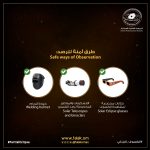‘Do you think he is autistic?’ asked a friend, over an email chat, years before any of the current social messaging apps had even been conceptualized. That though wasn’t a question that required analysis or an immediate evaluation; she was simply sharing her worry, her story about her ten-year old son. She was expressing her concerns in text speak, with ellipses thrown in to punctuate her embroiled thoughts.
‘Tired of teachers remarks…’
‘Getting daily notes from school’
Read More
- Why don’t more women participate in cardiac rehabilitation?
- Toxic Positivity: When “Stay Positive” Gets in the Way
- Embracing Omani parent’s culture: A Paragon to a Healthy Living
- We have plans to introduce robotic surgery in Oman, says Dr. Azad Moopen
- 175-bed multispecialty Aster Royal Al Raffah Hospital opens in Al Ghubra
‘Not attentive…not completing notes…not interested in studies…’
There were more such ‘not’s thrown in along with ‘he is careless’, ‘forgets things…’
In another line she said, ‘Mind is always wandering… I ask one question…he gives answer from another topic…’
Pan to the present, and those doubts have been quelled – a long time ago. Her child, now a working man, is not autistic. He does have some social anxieties and, at times, poor self esteem, but he has found a balance to get ahead in life, with counseling and guidance.
So, why am I sharing that old chat here, almost verbatim?
Two reasons: One, to unapologetically state that most over-thinking parents cannot stop those percolating thoughts during the early formative years when they feel compelled to put their child through a scanner to establish (or otherwise) that he/she is a regular school kid without any learning disabilities or behavioural problems.
Two, to encourage parents to share their stories; stories that concern their child’s learning or developmental problems with people in their immediate circle, community or with experts on the subject. For, sharing such stories can help create an understanding and a much needed acceptance.
It is, generally, a lack of awareness on the disorder that compounds the lack of acceptance.
As a parent of an ASD child emphasised, “Autism is not a mental health problem. People need to understand that autism is a development condition; it is not an illness…it is not contagious”.
People also need to understand that ASD children have difficulty with communication and interaction with other people; most show restrictive interests and are prone to display repetitive behaviours (called stimming) which people, who are unaware of autism symptoms, tend to classify as mental health ailments.
But that said, the most important thing, as the parent of a high-functioning autistic child stated, ‘is for the parents themselves to feel comfortable with it and not to feel ashamed in front of others’.
It is about finding that niche in which the kid is good at and enjoys. A few years ago, a study suggested that over 70% of autistic children and adults had a special isolated skill in memory, visuospatial abilities (to identify visual and spatial relationships among object), calculation, drawing or music. Whether that study is true across all spectrums may be debatable, but the crux of the issue is to assess the child’s potentials, understand the adult’s abilities.
Personally, I have had the good fortune of interacting with an autistic person who was endowed with the savant syndrome (it is a rare condition in which persons with various developmental disorders, including autistic disorder, have an amazing ability and talent) and could identify days of any given year in the past.
Like everything else in life, no two autistic children are the same, as the disorder includes social, communication and behavioural challenges and these can range from mild to severe. Diagnosis can be difficult as there are no medical tests to ascertain the disorder. The process, often, starts with the pediatrician, whose early assessment (18 months and 24 months) of the child’s development history and behaviour can lead to an early diagnosis.
Fortunately in Oman there are several NGOs and government-affiliated centres to help parents with their ASD child/children in learning and training them to adapt to their everyday needs.
So, as this weekend rolls over to a new month, and the calendar states ‘World Autism Awareness Day’, let’s literally or figuratively wear the blue badge to support the theme of ‘Transformation: toward a neuro-inclusive world for all.’
As the United Nations website states, the narrative around autism is gradually moving away from misconceptions of curing and converting autistic people to an inclusive approach focusing on accepting, supporting and involving autistic people, and embracing the concept of neurodiversity — the idea that people experience and interact with the world in many different ways and that there is no one ‘right’ way.







